Blog

Publications
Thesaurus : Doctrine

► Full Reference: R. Sève, "Compliance Obligation and changes in Sovereignty and Citizenship", in M.-A. Frison-Roche (ed.), Compliance Obligation, Journal of Regulation & Compliance (JoRC) and Bruylant, "Compliance & Regulation" Serie, to be published
____
📘read a general presentation of the book, Compliance Obligation, in which this article is published
____
► Summary of the article (done by the Journal of Regulation & Compliance - JoRC):
The contribution describes "les changements de philosophie du droit que la notion de compliance peut impliquer par rapport à la représentation moderne de l’Etat assurant l’effectivité des lois issues de la volonté générale, dans le respect des libertés fondamentales qui constituent l’essence du sujet de droit." ("the changes in legal philosophy that the notion of Compliance may imply in relation to the modern representation of the State ensuring the effectiveness of laws resulting from the general will, while respecting the fundamental freedoms that constitute the essence of the subject of law").
The contributor believes that the definition of Compliance is due to authors who « jouer un rôle d’éclairage et de structuration d’un vaste ensemble d’idées et de phénomènes précédemment envisagés de manière disjointe. Pour ce qui nous occupe, c’est sûrement le cas de la théorie de la compliance, développée en France par Marie-Anne Frison-Roche dans la lignée de grands économistes (Jean-Jacques Laffont, Jean Tirole) et dont la première forme résidait dans les travaux bien connus de la Professeure sur le droit de la régulation. » ( "play a role in illuminating and structuring a vast set of ideas and phenomena previously considered in a disjointed manner. For our purposes, this is certainly the case with the theory of Compliance, developed in France by Marie-Anne Frison-Roche in the tradition of great economists (Jean-Jacques Laffont, Jean Tirole) and whose first form was in her well-known work on Regulatory Law").
Drawing on the Principles of the Law of the American Law Institute, which considers compliance to be a "set of rules, principles, controls, authorities, offices and practices designed to ensure that an organisation conforms to external and internal norms", he stresses that Compliance thus appears to be a neutral mechanism aimed at efficiency through a move towards Ex Ante. But he stresses that the novelty lies in the fact that it is aimed 'only' at future events, by 'refounding' and 'monumentalising' the matter through the notion of 'monumental goals' conceived by Marie-Anne Frison-Roche, giving rise to a new jus comune. Thus, "la compliance c’est l’idée permanente du droit appliquée à de nouveaux contextes et défis." ("Compliance is the permanent idea of Law applied to new contexts and challenges").
So it's not a question of making budget savings, but rather of continuing to apply the philosophy of the Social Contract to complex issues, particularly environmental issues.
This renews the place occupied by the Citizen, who appears not only as an individual, as in the classical Greek concept and that of Rousseau, but also through entities such as NGOs, while large companies, because they alone have the means to pursue the Compliance Monumental Goals, would be like "super-citizens", something that the digital space is beginning to experience, at the risk of the individuals themselves disappearing as a result of "surveillance capitalism". But in the same way that thinking about the Social Contract is linked to thinking about capitalism, Compliance is part of a logical historical extension, without any fundamental break: "C’est le développement et la complexité du capitalisme qui forcent à introduire dans les entités privées des mécanismes procéduraux d’essence bureaucratique, pour discipliner les salariés, contenir les critiques internes et externes, soutenir les managers en place" ("It is the development and complexity of capitalism that forces us to introduce procedural mechanisms of a bureaucratic nature into private entities, in order to discipline employees, contain internal and external criticism, and support the managers in place") by forcing them to justify remuneration, benefits, and so on.
Furthermore, in the words of the author, "Avec les buts monumentaux, - la prise en compte des effets lointains, diffus, agrégés par delà les frontières, de l’intérêt des générations futures, de tous les êtres vivants - , on passe, pour ainsi dire, à une dimension industrielle de l’éthique, que seuls de vastes systèmes de traitement de l’information permettent d’envisager effectivement." ("With the Monumental Goals - taking into account the distant, diffuse effects, aggregated across borders, the interests of future generations, of all living beings - we move, so to speak, to an industrial dimension of ethics, which only vast information processing systems can effectively envisage").
This is how we can find a division between artificial intelligence and human beings in organisations, particularly companies, or in decision-making processes.
In the same way, individual freedom does not disappear with Compliance, because it is precisely one of its monumental goals to enable individuals to make choices in a complex environment, particularly in the digital space where the democratic system is now at stake, while technical mechanisms such as early warning will revive the right to civil disobedience, invalidating the complaint of "surveillance capitalism".
The author concludes that the stakes are so high that Compliance, which has already overcome the distinctions between Private and Public Law and between national and international law, must also overcome the distinction between Information and secrecy, particularly in view of cyber-risks, which requires the State to develop and implement non-public Compliance strategies to safeguard the future.
____
🦉This article is available in full text to those registered for Professor Marie-Anne Frison-Roche's courses
________
Thesaurus : Doctrine

► Full Reference: R. Sève, "L'obligation de compliance et les mutations de la souveraineté et de la citoyenneté" (Compliance Obligation and changes in Sovereignty and Citizenship), in M.-A. Frison-Roche (ed.), L'obligation de Compliance, Journal of Regulation & Compliance (JoRC) and Dalloz, coll. "Régulations & Compliance", 2024, forthcoming.
____
📕read the general presentation of the book, L'obligation de Compliance, in which this article is published.
____
► English Summary of this article (done by the Journal of Regulation & Compliance - JoRC) : The contribution describes "les changements de philosophie du droit que la notion de compliance peut impliquer par rapport à la représentation moderne de l’Etat assurant l’effectivité des lois issues de la volonté générale, dans le respect des libertés fondamentales qui constituent l’essence du sujet de droit." ("the changes in legal philosophy that the notion of Compliance may imply in relation to the modern representation of the State ensuring the effectiveness of laws resulting from the general will, while respecting the fundamental freedoms that constitute the essence of the subject of law").
The contributor believes that the definition of Compliance is due to authors who « jouer un rôle d’éclairage et de structuration d’un vaste ensemble d’idées et de phénomènes précédemment envisagés de manière disjointe. Pour ce qui nous occupe, c’est sûrement le cas de la théorie de la compliance, développée en France par Marie-Anne Frison-Roche dans la lignée de grands économistes (Jean-Jacques Laffont, Jean Tirole) et dont la première forme résidait dans les travaux bien connus de la Professeure sur le droit de la régulation. » ( "play a role in illuminating and structuring a vast set of ideas and phenomena previously considered in a disjointed manner. For our purposes, this is certainly the case with the theory of Compliance, developed in France by Marie-Anne Frison-Roche in the tradition of great economists (Jean-Jacques Laffont, Jean Tirole) and whose first form was in her well-known work on Regulatory Law").
Drawing on the Principles of the Law of the American Law Institute, which considers compliance to be a "set of rules, principles, controls, authorities, offices and practices designed to ensure that an organisation conforms to external and internal norms", he stresses that Compliance thus appears to be a neutral mechanism aimed at efficiency through a move towards Ex Ante. But he stresses that the novelty lies in the fact that it is aimed 'only' at future events, by 'refounding' and 'monumentalising' the matter through the notion of 'monumental goals' conceived by Marie-Anne Frison-Roche, giving rise to a new jus comune. Thus, "la compliance c’est l’idée permanente du droit appliquée à de nouveaux contextes et défis." ("Compliance is the permanent idea of Law applied to new contexts and challenges").
So it's not a question of making budget savings, but rather of continuing to apply the philosophy of the Social Contract to complex issues, particularly environmental issues.
This renews the place occupied by the Citizen, who appears not only as an individual, as in the classical Greek concept and that of Rousseau, but also through entities such as NGOs, while large companies, because they alone have the means to pursue the Compliance Monumental Goals, would be like "super-citizens", something that the digital space is beginning to experience, at the risk of the individuals themselves disappearing as a result of "surveillance capitalism". But in the same way that thinking about the Social Contract is linked to thinking about capitalism, Compliance is part of a logical historical extension, without any fundamental break: "C’est le développement et la complexité du capitalisme qui forcent à introduire dans les entités privées des mécanismes procéduraux d’essence bureaucratique, pour discipliner les salariés, contenir les critiques internes et externes, soutenir les managers en place" ("It is the development and complexity of capitalism that forces us to introduce procedural mechanisms of a bureaucratic nature into private entities, in order to discipline employees, contain internal and external criticism, and support the managers in place") by forcing them to justify remuneration, benefits, and so on.
Furthermore, in the words of the author, "Avec les buts monumentaux, - la prise en compte des effets lointains, diffus, agrégés par delà les frontières, de l’intérêt des générations futures, de tous les êtres vivants - , on passe, pour ainsi dire, à une dimension industrielle de l’éthique, que seuls de vastes systèmes de traitement de l’information permettent d’envisager effectivement." ("With the Monumental Goals - taking into account the distant, diffuse effects, aggregated across borders, the interests of future generations, of all living beings - we move, so to speak, to an industrial dimension of ethics, which only vast information processing systems can effectively envisage").
This is how we can find a division between artificial intelligence and human beings in organisations, particularly companies, or in decision-making processes.
In the same way, individual freedom does not disappear with Compliance, because it is precisely one of its monumental goals to enable individuals to make choices in a complex environment, particularly in the digital space where the democratic system is now at stake, while technical mechanisms such as early warning will revive the right to civil disobedience, invalidating the complaint of "surveillance capitalism".
The author concludes that the stakes are so high that Compliance, which has already overcome the distinctions between Private and Public Law and between national and international law, must also overcome the distinction between Information and secrecy, particularly in view of cyber-risks, which requires the State to develop and implement non-public Compliance strategies to safeguard the future.
________
Aug. 1, 2022
Compliance: at the moment

► Référence complète : Frison-Roche, M.-A., Quand on s'intéresse à la Compliance, lire "La Haine" de Günther Anders, 1ier août 2022.
___
► Introduction de l'article : Philosophe allemand, Günter Anders connut la Seconde Guerre mondiale, dût quitter l'Allemagne et vécut dans plusieurs pays. C'est avant tout un philosophe moral, habité par le pessimisme et l'idée que le nazisme n'était qu'une répétition générale, plutôt artisanale, de ce que nous attend : L'obsolescence de l'homme, son livre-maître qui en 1956 décrit le système économique comme ce qui broie les êtres humains en les réduisant à n'être plus que des êtres qui entretiennent des machines qui produisent des produits inutiles qu'ils consomment, les humains n'étant eux-mêmes que des machines désirantes.
En 1985 dans un volume paru en langue allemande et composé d'articles tous consacrés au thème de La haine, il donna comme contribution les éléments de travail de ce qu'il avait conçu comme dernière partie de son oeuvre démontrant l'appareillage obtenant "l'obsolescence de l'homme", dernier livre qu'il ne publia jamais.
Extrait de ce volume, ces documents de travail furent traduits en français et présentés par Philippe Ivernel : le titre en est La Haine.
I. LA FABRIQUE DE LA "HAINE COMME PRODUIT DE CONSOMMATION" POUR ENGENDRER DES COMBATS, PRODUCTEURS A LEUR TOUR DE HAINE : L'ARTICULATION DES DEUX HAINES
Anders est un penseur de la technique, de la technologie (comme l'est Jacques Ellul), expliquant qu'elle n'appartiendra plus à une élite mais au contraire à chacun dans notre vie quotidienne, se mettant ainsi au centre de tout, remplaçant notamment la politique, les êtres humains mécanisés devenant la matière première des machines.
Le titre original, La Haine à l'état d'antiquité désigne le fait que la société de consommation réduisant l'être humain à son aptitude à entretenir des machines et à se comporter lui-même comme une machine consommant les produits fabriqués par des machines, l'être humain ayant pour seul fonction de désirer consommer ce que produisent les machines, et désirant donc finalement rien d'autres qu'entretenir et développer les machines qui l'engloutissent sous tous ces biens, n'a plus de pensée que pour ce monde entièrement voué aux machines.
L'Amour et la Haine sont ainsi reléguées "à l'état d'antiquité" car pour trouver sa place dans ce système de désirs qui convergent vers les machines, il n'est besoin ni d'Amour ni de Haine. Il expose que cela se passe dans deux temps. Dans un premier temps, la Haine est fabriquée pour amener les humains à se battre contre des ennemis qu'ils ne connaissent même pas ; dans un second temps, ils sont suffisamment mécanisés pour attaquer sans que l'énergie de la Haine soit même nécessaire.
Le premier fragment de ses documents de travail expose la façon dont les êtres humains "aiment la Haine" car cela donne à chacun le sentiment d'exister : la Haine. "Je hais, donc je suis. Ou plus précisément : Donc je suis quelqu'un" (p.33).
Il reprend cette idée dans le deuxième fragment dont le titre est (en français dans l'édition allemande) : L'appétit vient en mangeant. Il expose que la Haine n'est pas au départ contre une personne particulière et pousse à l'attaquer. La Haine est à l'état pur, mais c'est plutôt l'atmosphère de haine et "l'amour de la haine". Il suffit de la cultiver et la tourner ensuite à volonté contre un tel ou un tel.
Il évoque ainsi une sorte d'industrie de la haine, en des termes qu'il met dans la bouche du personnage qui dirige la cité : "Sans doute est-il exact qu'ils combattent "leurs ennemis" parce qu'ils les haïssent. Sauf que cette haine envers "leurs ennemis" n'explose précisément pas en s'allumant d'elle-même-meme, ni parce que les premiers leur auraient fait quoi que ce soit. Mais uniquement par ceci que (et donc parce que) je leur livre la haine à chaque fois exigible. Ils la reçoivent de moi gratuitement à domicile. Exactement comme l'eau, le gaz et la TV. Et cette haine qui leur est acheminée, ils la consomment alors, et dans tout à fait dans mon sens à moi : car ils s'engagent, en effet, pleins de haine dans la lutte politiquement opportune. Après quoi commence aussi réellement ce dont vous venez de parler : la deuxième phase de la haine. Car à présent ils haïssent réellement du fait qu'ils combattent. La règle de la haine s'énonce comme suite : "Je combats quelqu'un - de ce fait je me mets à le haïr. L'appétit vient en mangeant, la haine vient en luttant". Ils se battent ainsi "avec appétence" et sont persuadés le faire "avec dignité", devant rester dans l'ignorance de l'absence de raison du combat (qui est la pure volonté de celui qui leur a envoyé la Haine).
Günther Anders fait ensuite expliquer par le personnage politique qu'il fait cela par moralité car il ne veut pas que les hommes en tuent d'autres juste par obéissance à ses ordres, ce qu'ils trouveraient immoral. Il leur fabrique alors de la Haine, de la Haine qu'ils aiment, qu'il dirige ensuite sur des groupes de personnes et ainsi dotés de cette première haine, ils attaquent ceux qu'ils haïssent, le combat accroissant par une seconde haine la première, et tout le système fonctionne bien. Il lui fait ainsi conclure : "C'est pourquoi ils ont besoin de haïr. C'est pourquoi je leur accorde de haïr. C'est pourquoi je leur ordonne de haïr.".
Le troisième fragment porte sur la guerre proprement dite. Anders expose que la Haine n'y est aujourd'hui plus requise parce que la technique permet aux soldats de n'être plus en contact avec les personnes qu'ils combattent, ni même d'être confrontés aux cadavres. La fabrique de la Haine serait donc devenue inutile. C'est pour cela aussi qu'elle aurait vocation à être rangée dans les antiquités... Les soldats sont devenus comme des robots.
Le quatrième fragment développe ce point, sur des soldats "aveugles en telos", au point qu'on pourrait davantage les qualifier "d'employés" des armées que de soldats, exécutant leur travail sans savoir sur qui ou quoi ils larguent les bombes, chacun étant désormais comme à l'arrière du front. Anders souligne que dans ce combat sans haine, mené par les ordinateurs, le combat ne prend jamais fin.
II. UNE EXTRAORDINAIRE ANTICIPATION DU SYSTEME COMMERCIALE ET POLITIQUE E DE HAINE
A. DISTINCTION DES DEUX HAINES ET ROBOTISATION DES ETRES HUMAINS
L'œuvre de Gunther Anders est particulièrement profitable pour comprendre le monde dans lequel nous vivons. Dans cette ébauche d'ouvrage, retenons l'idée d'une double haine : la Haine fabriquée comme un objet et apportée gratuitement à tout le monde car il y a chez chacun un "amour de la haine" qui est en soi, puisqu'en haïssant, on se sent exister.
La Haine est un objet économique pur, car elle n'a pas d'objet particulier. Elle est fabriquée, cultivée, diffusée, accrue, partagée. Ce n'est que dans un second temps, après avoir ainsi inséré de la Haine pure dans l'esprit des amoureux de la Haine, que l'on peut lui affecter un objet, une personne ou un groupe de personnes et qu'un combat contre ceux-ci peut commencer, producteur d'un second type de Haine. Les deux Haines s'accroissent l'une l'autre.
Le premier intérêt de cette conception est d'isoler ce premier temps de la Haine : une Haine à l'état pur, celle qui existe car haïr permet d'exister, indépendamment de l'objet de la haine. Ce n'est pas donc pas l'objet qui fait naître la Haine, mais l'amour de soi qui fait naître la Haine. Dans un second temps, c'est le hasard ou la manipulation d'un tiers (dans l'exemple pris par Anders le dirigeant politique, mais nous connaissons des influenceurs en dehors du cercle politique) qui offre à la Haine son objet. Mais Anders insiste sur le fait que ces objets sont substituables.
Par cette Haine fabriquée, les êtres humains ont donc l'impression d'exister. C'est alors un stade pire et paradoxal qui s'annonce : celui des êtres humains sans haine, parce qu'on leur aura ôté l'objet de Haine, alors même qu'on leur commande (comme à des "employés") de tuer des semblables, en les mettant technologiquement à distance de l'objet à détruire (Anders prend l'exemple du lancer de bombe). Ils deviennent des robots, et la déshumanisation est ainsi achevée.
C'est en cela que les 4 fragments constituent pleinement la dernière partie de l'œuvre centrale qu'est L'obsolescence de l'Homme.
B. LE MONDE NUMERIQUE, LES RÉSEAUX SOCIAUX ET L' "INTELLIGENCE ARTIFICIELLE"
Le travail publié en 1985 correspond à des réflexions élaborées juste après la Seconde Guerre mondiale et puisant dans les leçons de la Première.
Mais si l'on regarde le monde numérique dans lequel nous vivons, il est en premier lieu construit sur des technologies "neutres", une industrie de l'information qui transforme les êtres humains en consommateurs d'information et en source d'information, constituant eux-mêmes une masse de micro-informations.
En deuxième lieu, les plateformes, et plus particulièrement les réseaux sociaux, sont des espaces neutres, les entreprises qui les tiennent ne sont pas des éditeurs, et le produit pur qui y circulent le mieux est de la "Haine pure", qui est ce qui rapporte à ces entreprises le plus de revenus, les différents objets de haines étant interchangeables.
La Haine est devenue un objet qui est délivré à domicile et dont nous sommes abreuvés en permanence, notre "amour de la Haine" étant alimentée en continu, et sans doute accru.
En troisième lieu, les algorithmes sont présentés comme "intelligents", c'est-à-dire dotés d'une capacité non seulement d'apprentissage mais de choix et de discernement. L'intelligence artificielle serait le progrès, c'est-à-dire la disparation de la haine pour exemple pour prononcer les sanctions les plus adéquates. Les chiffres ont donc remplacé les êtres humains, ce qu'Anders visait à travers les "ordinateurs".
III. LE PROFIT QUE LE DROIT DE LA COMPLIANCE PEUT FAIRE DE LA PENSÉE DE GUNTHER ANDERS
A. LE DROIT DE LA COMPLIANCE, DROIT AYANT LA PRÉTENTION DE RÉDUIRE LA HAINE DANS L'ESPACE NUMÉRIQUE
Le Droit de la Compliance est une branche du Droit construit sur des prétentions politiques qui visent à concrétiser des "buts monumentaux".
🔴Marie-Anne Frison-Roche, 📝Les Buts Monumentaux, cœur battant du Droit de la Compliance, in Marie-Anne Frison-Roche (dir.), 📕 Les buts monumentaux de la compliance, Journal of Regulation & Compliance et Dalloz, coll. 📚Régulations & Compliance, 2022, p.21-44.
La lutte contre la diffusion de ce qu'il est pertinent de désigner comme l'amour naturel de la haine pure, qui se répand d'une façon virale dans l'espace numérique permettant à la haine d'être "portée à domicile" est une des objets majeurs du Droit de la Compliance.
Le Digital Services Act est imprégné de techniques de Compliance pour y parvenir.
Il ne s'agit pas de compter sur la moralité des personnes, puisque le cœur des humains est d'aimer la haine, ni de les remplacer par des machines car le remède est pire que le mal (la déshumanisation) mais sur la performance technique de ceux qui tiennent ce système économique-là : les plateformes elles-mêmes.
🔴M.A. Frison-Roche, 📝Se tenir bien dans l'espace numérique, in Mélanges en l'honneur de Michel Vivant, Penser le droit de la pensée, Dalloz et Lexis Nexis, 2020, pp. 155-168.
En combattant le feu par le feu, c'est-à-dire en obligeant ceux qui ont construit les techniques par lesquelles se diffusent la Haine à construire et à utiliser les techniques de contrôle, de détection et de prévention de celle-ci, le Droit de la Compliance, notamment grâce à son effet naturellement extraterritorial, exprime la prétention de ne pas laisser la Haine régner.
En outre, les Autorités publiques non seulement régulent mais encore supervisent les entreprises et leurs technologies, en l'espèce l'Arcom et la CNIL, dont les pouvoirs Ex Ante s'accroissent.
🔴R.-O. Maistre, Quels buts monumentaux pour le Régulateur dans un paysage audiovisuel et numérique en pleine mutation ?, in Frison-Roche, M.-A. (dir.), Les buts monumentaux de la Compliance, série "Régulations & Compliance", Journal of Regulation & Compliance (JoRC) et Dalloz, 2022.
B. LA DÉFINITION TÉLÉOLOGIQUE DU DROIT DE LA COMPLIANCE
L'œuvre d'Anders est parcourue par le désespoir moral d'êtres humains "sans telos", c'est-à-dire sans finalités qui leur soit propres. C'est ainsi qu'ils peuvent être saisis aisément par l'amour de la Haine, puisqu'aucun projet propre n'occupe leur temps et leur force.
Il peut en être de même pour la force du Droit.
Si le Droit ne devait être qu'une technique "réglementaire", "neutre", visant à "l'efficacité" des désirs de chacun et des réglementations accumulées, alors le Droit ne ferait qu'ajouter à la déshumanisation décrite par Anders.
Mais le Droit de la Compliance est par nature une branche du Droit téléologique : elle se définit par ses buts. Et ceux-ci sont "monumentaux".
Ces buts monumentaux ponctuels peuvent tous se ramener à ceci : protéger les êtres humains, afin que la description d'Anders ne soit pas exacte en son cœur désespéré.
🔴M.-A. Frison-Roche, 🚧 Fonder la Compliance, 2022
July 12, 2022
Thesaurus : Doctrine
► Référence complète : A. Supiot, "L’erreur de Foucault. Réflexions sur le biopouvoir", in Mélanges en l’honneur du Professeur Catherine Labrusse-Riou, Éditions de l'Institut de Recherche Juridique de la Sorbonne (IRJS), 2022, pp. 395-413.
____
► Résumé de l'article :
____
🦉Cet article est accessible en texte intégral pour les personnes inscrites aux enseignements de la Professeure Marie-Anne Frison-Roche
________
Sept. 1, 2021
Compliance: at the moment

► An article published on July 14, 2021 by The Wall Street Journal, "Brain Implant Lets Man 'Speak' After Being Silent for More Than a Decade", relays the information that it is now possible, on an experimental basis, to implant in the brain a device allowing a person deprived by a neurological accident to speak to be able to express himself again by writing his thoughts directly on a computer screen, on which the words thought are displayed in sentences.
____
Several years of "fundamental" research, notably on the part of Facebook, which, in particular by subsidizing the French professor of neurosciences Stanislas Dehaene, in a comparison between the learning development of the brain and the development of "deep learning", have been successful. to allow people who have lost the use of the voice to write directly on screens without this vocal medium by going directly from thought to writing.
This leads to three reflections, putting Law and Technology at the center:
1. at first glance, speech being only a medium between thought and expression, it would be conceivable to do without it;
2. However, it is required to draw a parallel with the new technology of "emotional recognition" by which thoughts are accessible to third parties, which thwarts the fundamental right to make one's thoughts inaccessible to others;
The news has shown precisely that this technology, making possible to capture the true thoughts of others despite feigned facial expressions, poses a problem with regard to the fundamental right to lie or to remain silent (see in this regard 📧 MaFR, "Compliance and Ethics Technologies may be inadmissible "in themselves" and conceiving of their "ethical use" is therefore not admissible: practical case on the control of workers' emotions ").
3. By anticipating the possible use of this new technology and the legal reaction to this potentiality, the same question raises whether, per se, such an implantation of a tool for "capturing thoughts directly in the brain" to obtain their "direct translation on a screen" should not be considered as the equivalent of capturing thoughts, just as infringing on everyone's fundamental right to keep their thoughts inaccessible.
Here again, the fact that in one or two cases, this made it possible to cure a person does not legitimize the technology in itself.
Likewise, the fact that the person "consents" is not sufficient to legitimize what may be a per se attack on the dignity of the human person if the technology has the effect of capturing thoughts with a loss of control. the person concerned. For the moment, in the description given by the researchers according to the article which relates the innovation, it is the transmitter who controls the technology but the elimination of the medium of speech or writing deserves to be conceptualized, in the loss of isolation of the individual, isolation to which the Western tradition has often associated Freedom.
_____
Aug. 30, 2021
Compliance: at the moment

► An article from March 3, 2021, Smile for the camera: the dark side of China's emotion-recognition tech, then an article from June 16, 2021, "Every smile you fake" - an AI emotion - recognition system can assess how "happy" China's workers are in the office describes how a new technology of emotional recognition is able, through what will soon be out of fashion to call "facial recognition", to distinguish a smile that reflects a mind state of real satisfaction from a smile which does not correspond to it. This allows the employer to measure the suitability of the human being for his or her work. It is promised that it will be used in an ethical way, to improve well-being at work. But isn't it in itself that this technology is incompatible with any compensation through ethical support?
The technology developed by a Chinese technology company and acquired by other Chinese companies with many employees, allows to have information on the actual state of mind of the person through and beyond his or her facial expressions and bodily behavior.
Previously, the technology of emotional recognition had been developed to ensure security, by fighting against people with hostile plans, public authorities using it for example in the controls at airports to detect the criminal plans which some passengers could have.
It is now affirmed that it is not about fighting against some evil people ("dangerousness") to protect the group before the act is committed ("social defense”) but that it is about helping all workers.
Indeed, the use that will be made of it will be ethical, because first the people who work for these Chinese companies with global activity, like Huawaï, do it freely and have accepted the operation of these artificial intelligence tools (which is not the case with people who travel, control being then a kind of necessary evil that they do not have to accept, which is imposed on them for the protection of the group), but even and above all, the purpose is itself ethical: if it turns out that the person does not feel well at work, that they are not happy there, even before they are perhaps aware, the company can assist.
Let’s take this practical case from the perspective of Law and let’s imagine that it is contested before a judge applying the principles of Western Law.
Would this be acceptable?
No, and for three reasons.
1. An "ethical use" cannot justify an unethical process in itself
2. The first freedoms are negative
3. "Consent" should not be the only principle governing the technological and digital space
I. AN "ETHICAL USE" CAN NEVER LEGITIMATE AN UNETHICAL PROCESS IN ITSELF
These unethical processes in themselves cannot be made "acceptable" by an "ethical use" which will be made of them.
This principle was especially reminded by Sylviane Agacinski in bioethics: if one cannot dispose of another through a disposition of his or her body which makes his or her very person available (see not. Agacinski, S., ➡️📗Le tiers-corps. Réflexions sur le don d’organes, 2018).
Except to make the person reduced to the thing that his or her body is, which is not ethically admissible in itself, that is excluded, and Law is there in order to this is not possible.
This is even why the legal notion of "person", which is not a notion that goes without saying, which is a notion built by Western thought, acts as a bulwark so that human beings cannot be fully available to others, for example by placing their bodies on the market (see Frison-Roche, M.-A., ➡️📝To protect human beings, the ethical imperative of the legal notion of person, 2018). This is why, for example, as Sylviane Agacinski emphasizes, there is no ethical slavery (a slave who cannot be beaten, who must be well fed, etc.).
That the human being agrees ("and what about if it pleases me to be beaten?") does not change anything.
II. THE FIRST FREEDOM IS THE ONE TO SAY NO, FOR EXAMPLE BY REFUSING TO REVEAL YOUR EMOTIONS: FOR EXAMPLE HIDING IF YOU ARE HAPPY OR NOT TO WORK
The first freedom is not positive (being free to say Yes); it is negative (being free to say No). For example, the freedom of marriage is having the freedom not to marry before having the freedom to marry: if one does not have the freedom not to marry, then the freedom to marry loses any value. Likewise, the freedom to contract implies the freedom not to contract, etc.
Thus, freedom in the company can take the form of freedom of speech, which allows people, according to procedures established by Law, to express their emotions, for example their anger or their disapproval, through the strike.
But this freedom of speech, which is a positive freedom, has no value unless the worker has the fundamental freedom not to express his or her emotions. For example if he or she is not happy with his or her job, because he or she does not appreciate what he or she does, or he or she does not like the place where he or she works, or he or she does not like people with whom he or she works, his or her freedom of speech demands that he or she have the right not to express it.
If the employer has a tool that allows him or her to obtain information about what the worker likes and dislikes, then the employee loses this first freedom.
In the Western legal order, we must be able to consider that it is at the constitutional level that the infringement is carried out through Law of Persons (on the intimacy between the Law of Persons and the Constitutional Law, see Marais , A., ➡️📕Le Droit des personnes, 2021).
III. CONSENT SHOULD NOT BE THE ONLY PRINCIPLE GOVERNING THE TECHNOLOGICAL AND DIGITAL SPACE
We could consider that the case of the company is different from the case of the controls operated by the State for the monitoring of airports, because in the first case observed people are consenting.
"Consent" is today the central notion, often presented as the future of what everyone wants: the "regulation" of technology, especially when it takes the form of algorithms ("artificial intelligence"), especially in digital space.
"Consent" would allow "ethical use" and could establish the whole (on these issues, see Frison-Roche, M.-A., ➡️📝Having a good behavior in the digital space, 2019).
"Consent" is a notion from which Law is today moving away in Law of Persons, in particular as regards the "consent" given by adolescents on the availability of their body, but not yet on digital.
No doubt because in Contract Law, "consent" is almost synonymous with "free will", whereas they must be distinguished (see Frison-Roche, M.-A., ➡️📝Remarques sur la distinction entre la volonté et le consentement en Droit des contrats, 1995).
But we see through this case, which precisely takes place in China, that "consent" is in Law as elsewhere a sign of submission. It is only in a probative way that it can constitute proof of a free will; this proof must not turn into an irrebuttable presumption.
The Data Regulatory Authorities (for example in France the CNIL) seek to reconstitute this probative link between "consent" and "freedom to say No" so that technology does not allow by "mechanical consents", cut off from any connection with the principle of freedom which protects human beings, from dispossessing themselves (see Frison-Roche, M.-A., Yes to the principle of will, No to pure consents, 2018).
The more the notion of consent will be peripheral, the more human beings will be able to be active and protected.
________
June 23, 2021
Editorial responsibilities : Direction of the collection "Cours-Série Droit privé", Editions Dalloz (33)
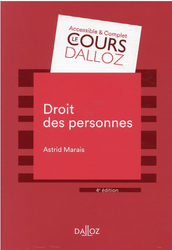
► Référence complète : MARAIS, Astrid, Droit des personnes, Coll. "Cours Dalloz-Série Droit privé", Dalloz, 4ième éd. 2021, 250 p.
📝 Lire la 4ième de couverture.
Depuis la première édition de son ouvrage, la professeure Astrid Marais débute la présentation de celui-ci ainsi : "Tout est chose ou personne".
À partir de ce principe essentiel, le manuel décrit comment le droit détermine les deux catégories de personnes : les personnes physiques et les personnes morales, comme il les individualise et comment il les protège. Le souci des personnes physiques est d'autant plus grand aujourd'hui que le droit prend en considération le corps des êtres humains.
C'est notamment pourquoi l'ouvrage expose le "Droit des personnes" à travers les diverses branches du Droit, désormais toutes concernées par celles-ci.
____
📚Consulter l'ensemble de la collection dans laquelle l'ouvrage a été publié.
Dec. 7, 2020
Thesaurus : Doctrine
Full reference: Vergnolle, S., L'effectivité de la protection des personnes par le droit des données à caractère personnel (The effectiveness of the protection of people by personal data Law (our translation)), Passa, J. (dir.), thesis, Law, Panthéon-Assas University (Paris II), 2020, 531 p.
Read directly and only the table of contents (in French)
To go further about regulation of personal data, read:
- Frison-Roche, M.-A., Rethinking the world from the notion of data, 2016
- Frison-Roche, M.-A., The regulatory conséquences of a world redesigned from the concept of data, 2016.
Nov. 23, 2020
Interviews

Full reference: Frison-Roche, M.-A., Facebook: Quand le Droit de la Compliance démontre sa capacité à protéger les personnes (Facebook: When Compliance Law proves its ability to protect people), interview with Olivia Dufour, Actu-juridiques Lextenso, 23rd of November 2020
Read the interview (in French)
Read the news of the Newsletter MAFR - Law, Compliance, Regulation about this question
Sept. 16, 2020
Publications

🌐follow Marie-Anne Frison-Roche on LinkedIn
🌐subscribe to the Newsletter MAFR Regulation, Compliance, Law
____
Full reference: M.-A. Frison-Roche, Se tenir bien dans l'espace numérique, in Penser le droit de la pensée. Mélanges en l'honneur de Michel Vivant, Lexis Nexis and Dalloz, 2020, pp. 155-168.
____
📝Read the article (in French)
____
English summary of the article: The digital space is one of the scarce spaces not framed by a specific branch of Law, Freedom also offering opportunity to its actors to not "behave well", that is to express and diffuse broadly and immediately hateful thoughts through Hate speechs, which remained before in private or limited circles. The intimacy of Law and of the legal notion of Person is broken: Digital permits to individuals or organizations to act as demultiplied and anonymous characters, digital depersonalized actors who carry behaviors that are hurtful to other's dignity.
Against that, Compliance Law offers an appropriate solution: internalizing in digital crucial operators the mission to disciplinary and substantially hold the digital space. The digital space has been structured by powerful firms able to maintain order. Because Law must not reduce digital space to be only a neutral market of digital prestations, these crucial operators, like social networks or search engines, must be forced to substantially control behaviors. It could be about an obligation of internet users to act with their face uncover, "real identity" policy controlled by firms, and to respect others' rights, privacy rights, dignity, intellectual property rights. In their Regulatory function, digital crucial firms must be supervised by public authorities.
Thus, Compliance law substantially defined is the protector of the person as "subject of law" in the digital space, by the respect that others must have, this space passing from the status of free space to the one of civilized space, in which everyone is obliged to behave well.
______
Read to go further:
- Frison-Roche, M.-A., L'apport du Droit de la Compliance à la gouvernance d'Internet, 2019
- Frison-Roche, M.-A. (dir.), Internet, un espace d'interrégulation, 2016
Dec. 4, 2019
MAFR TV : MAFR TV - case
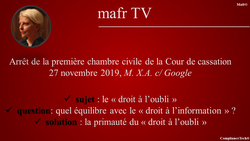
Regarder le film de 5 minutes sur le contenu, le sens et la portée de l'arrêt rendu par la première chambre civile de la Cour de cassation du 27 novembre 2019, M.X.A. c/ Google.
Cet arrêt casse l'arrêt de la Cour d'appel de Paris qui valide le non-déférencement, après que la CNIL a demandé l'interprétation des textes, notamment du RGPD, parce que le droit à l'oubli doit limiter l'exception ici invoquée, à savoir le droit à l'information, même s'il s'agit d'une décision pénale concernant un commissaire-aux-comptes, car il s'agit d'une affaire privée et non pas ce qui concerne l'exercice de sa profession réglementée coeur du système financier.
Sept. 7, 2019
Blog

Lisant sur mon écran d'ordinateur un article en accès libre dans une revue en partie librement accessible numériquement, une mention attire mon attention.
Elle a de quoi laisser perplexe toute personne qui écrit des articles et ouvrage qui requiert des lectures, lectures dont on indique au lecteur la trace pour l'inviter à son tour à y procéder dans ses propres recherches. Dans des travaux de recherche, de découverte et d'interrogation, donc.
Voilà le texte de la mention. :
Des DOI (Digital Object Identifier) sont automatiquement ajoutés aux références par Bilbo, l'outil d'annotation bibliographique d'OpenEdition.
Les utilisateurs des institutions abonnées à l'un des programmes freemium d'OpenEdition peuvent télécharger les références bibliographiques pour lesquelles Bilbo a trouvé un DOI.
"sont automatiquement ajoutés" ?
Il s'agit littéralement d'un "outil d'annotation bibliographique" ?
Si l'on s'abonne (le prix n'est pas indiqué, mais quand on écrit "-ium", c'est pour dire que l'on sort du gratuit...; comme le fait l'entreprise américaine Academia qui propose rapidement de "upgrapder" par un service payant pour accéder ), automatiquement les références seront téléchargées dès l'instant que l'algorithme, répondant au nom de "Bilbo" (n'est-ce pas le nom d'un personnage dans Le seigneur des anneaux ?), mais qui dans le civil a un nom qui reproduit sa fonction (Digital Object Identifier) fonction exprimée en langue anglaise va "automatiquement ajouter" une référence aux autres références qui auront été tacquées par l'algorithme.
Est-ce raisonnable ? Est-ce efficace ? Est-ce sans danger ?
C'est mécaniquement efficace, dès l'instant que l'on conçoit la référence bibliographique comme un "entassement mécanique" (I). Mais la référence bibliographique est et doit être tout autre chose, ce que les machines ne peuvent en rien restituer : être le reflet du parcours intellectuel que l'être humain qui écrivit l'article ou l'ouvrage fit pour écrit ce texte-là, une invitation à la lecture (et les machines ne lisent pas, on en arrive aujourd'hui à devoir le rappeler). Cette définition qui fut partagée de la bibliographie, qui ne mesure pas l'ampleur de l'empilement mais dessine ce vers quoi l'auteur s'est tourné pour chercher, pour trouver des réponses aux questions qu'il s'est posées, cela seul une personne peut le faire. En rien "Bilbo" (II). Or, si l'on se repose sur celui-ci, contre un abonnement, pour faire cette tâche-là, qui n'est reflet de rien, non seulement la bibliographie ne sera plus rien, mais des effets pervers, comme ceux observés comme celui des "citations", vont s'accroître (III).
Ensuite, si Bilbo écrit les bibliographie, tandis que Sophia fait les conférences, pourquoi un autre algorithme, que l'on pourrait appeler Thesarus ne pourrait pas écrire thèse, livre, essai, article, en ayant compilé toutes les règles formelles à respecter. Pourquoi non ? On se souviendra alors que les machines et les suites de chiffres ne lisent pas, n'écrivent pas, ne conçoivent pas, n'apprennent pas (l'expression Learning machine est un oximore), ne mémorisent pas (la "mémoire" d'un ordinaire n'est qu'une image), ne traduisent pas, n'ont pas d'émotion, n'aiment pas. Seuls les êtres humains le peuvent. Le sait-on encore ?
Lire ci-dessous une analyse plus détaillée.

Updated: July 4, 2019 (Initial publication: April 30, 2019)
Publications

► Complete reference : Frison-Roche, M.-A., Having a good behavior in the digital space, working paper, April 2019.
____
Summary: The jurist sees the world through the way he learns to speak
The Law of the Environment has already come to blur this distinction, so finally so strange because this classical conception refers to a person taken firstly in his immobility (Law of individuals), and then in his only actions (Contrats and Tort Law, Property Law). Indeed, the very notion of "environment" implies that the person is not isolated, that he/she is "surrounded", that he/she is what he/she is and will become because of what surrounds him/her ; in return the world is permanently affected by his/her personal action. On second thought, when once "Law of Individuals" was not distinguished from Family Law, the human being was more fully restored by this division in the legal system that not only followed him/her from birth to death but also in him/her most valuable interactions: parents, siblings, couples, children. Thus Family Law was finer and more faithful to what is the life of a human being.
To have instituted Law of Individuals, it is thus to have promoted of the human being a vision certainly more concrete, because it is above all of their identity and their body about what Law speaks, astonishing that we have not noticed before that women are not men like the others. To have instituted the Law of the people, it is thus to have promoted of the human being a vision certainly more concrete, because it is above all of his identity and his body that one speaks to us, astonishing that the we have not noticed before that women are not men like the others
From this concrete vision, we have all the benefits but Law, much more than in the eighteenth century, perceives the human being as an isolated subject, whose corporeality ceases to be veiled by Law
This freedom will come into conflict with the need for order, expressed by society, social contract, state, law, which imposes limits on freedom of one to preserve freedom of the other, as recalled by the French Déclaration des Droits de l'Homme of 1789. Thus, it is not possible de jure to transform every desire in action,, even though the means would be within reach of the person in question, because certain behaviors are prohibited in that they would cause too much disorder and if they are nevertheless committed, they are punished for order to return. Thus, what could be called "law of behavior", obligations to do and not to be put in criminal, civil and administrative Law, national and international Law, substantial Law and procedural Law :they will protect the human being in movment pushed by the principle of freedom forward others and thing, movement inherent in their status as a Person.
The human being is therefore limited in what they want to do. In the first place by the fact: their exhausting forces, their death that will come, the time counted, the money that is lacking, the knowledge that they does not even know not holding, all that is to say by their very humanity; Secondly, by the Law which forbids so many actions ...: not to kill, not to steal, not to take the spouse of others, not to pass as true what is false, etc. For the human being on the move, full of life and projects, Law has always had a "rabat-joy" side. It is for that reason often ridiculous and criticized because of all its restraining regulations, even hated or feared in that it would prevent to live according to our desire, which is always my "good pleasure", good since it is mine. Isolated and all-powerful, the human being alone not wanting to consider other than its desire alone.
Psychoanalysis, however, has shown that Law, in that it sets limits, assigns to the human being a place and a way of being held with respect to things and other persons. If one no longer stands themselves by the prohibition of the satisfaction of all desire (the first of which is the death of the other), social life is no longer possible
But this presentation aims to make it possible to admit that the criterion of Law would be in the effectiveness of a sanction by the public power: the fine, the prison, the confiscation of a good, which the rudeness does not trigger whereas Law would imply it: by this way we are thus persuaded of the intimacy between the public power (the State) and Law... But later, after this first lesson learned, the doubt comes from the consubstansuality between Law and State. Is it not rather appropriate to consider that Law is what must lead everyone to "behave well" with regard to things and people around them? The question of punishment is important, but it is second, it is not the very definition of Law. The French author Carbonnier pointed out that the gendarme's "kepi" is the "Law sign", that is to say what it is recognized without hesitation, but it is not its definition.
The first issue dealt with by Law is then not so much the freedom of the person as the presence of others. How to use one's freedom and the associated deployment of forces in the presence of others? How could I not using it when I would like to harm them, or if the nuisance created for them by the use of my free strength is indifferent to me
We do not use our force against others because we have interest or desire, we do not give him the support of our strength while he indifferent us, because Law holds us. If the superego was not enough. If Law and the "parental function of the States" did not make alliance. We do it because we hold ourselves
Or rather we were holding ourselves.
Because today a new world has appeared: the digital world that allows everyone not to "hold" himself, that is to say to constantly abuse others, never to take them into consideration, to attack massively. It's a new experience. It is not a pathological phenomenon, as is delinquency (which simply leads to punishment), nor a structural failure in a principle otherwise admitted (which leads to regulatory remedies) but rather a new use, which would be a new rule: in the digital space, one can do anything to everyone, one is not held by anything or anyone, one can "let go" (I). This lack of "good behavior" is incompatible with the idea of Law, in that Law is made for human beings and protect those who can not afford to protect themselves; that is why this general situation must be remedied (II).
Cornu, G., Linguistique juridique, 2005.
Frison-Roche, M.-A. & Sève, R., Le Droit au féminin (ed.), 2003.
Under this "mask" of the "subject of Law", we are all equal. S. Archives de Philosophie du Droit, Le sujet de droit, 1989.
Baud, J.P., L'affaire de la main volée. Histoire juridique du corps humain, 1993.
On neurosis as a constitutive mode of child sociability, s. Lebovici, S., "C'est pas juste", in La justice. L'obligation impossible, 1994.
Read the article of Alain Supiot about the idée of Rule common of all, under the discussion between all, presented by this author through the artwork of Kafka : "Kafka, artiste de la loi", 2019; Kafka is very present in the work of Alain Supiot, for example in his First Lesson in the Collège de France, 2012, or in an Introduction of La Gouvernance par les nombres ; This latter book is now available in English : Governance by numbers. The making a legal model of allegiance, 2017 (translated by S. Brown).
That's why splitting Persons Law and Family Law masks another reality: the family is not made up of third parties. The links are there. They pre-exist. Starting from the only Persons Law pushes to think one can "build" his/her family by links drawn on white paper: the contracting of the families made up of individuals becomes thinkable, even natural.
May 14, 2019
Conferences
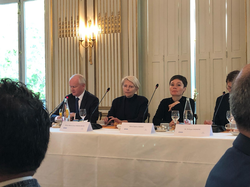
Référence complète : Frison-Roche, M.-A., participation à la table-ronde L'officier public ministériel est-il soluble dans la blockchain?, conférence-débat organisée par Le Club du Droit & le Conseil supérieur du Notariat, 14 mai 2019, Paris.
Consulter la présentation générale du colloque.
Consulter le document de travail sur la base duquel l'intervention a été faite.
Lire le compte-rendu qui en a été fait dans la presse.
Dans cette table-ronde, un professeur d'économie expose la dimension technologique et économique de la blockchain.
Puis est abordée la dimension juridique, dont l'exposé m'était plus particulièrement confié.
_____
A ce titre, après avoir replacé la question technique dans ce que doit garder le Droit, à savoir la distinction entre la Personne et les choses, ce que la technologie présentée aujourd'hui comme un ensemble de choses "intelligentes" et "décidantes" remettant en cause...., l'intervention porte sur 4 points (qui sont développés dans le document de travail).
En premier lieu, avant de porter une appréciation sur ce qui est adéquat et sur l'avenir il faut distinguer les fonctions techniques de conservation des actes, de duplication des actes et d'élaboration des actes, la distinction entre negotium et instrumentum n'étant en rien effacée par la technologie des blockchains.
En deuxième lieu, dès l'instant qu'il y a une altération substantielle de l'acte instrumentaire parce qu'un nouveau negotium a eu lieu, parce que les mentions doivent mesurer la reproduction de la réalité de ce qui fut décidé par les parties, l'on n'est plus dans l'acte de conserver et de dupliquer à l'identique, mais dans l'acte d'élaboration. Or, dans l'acte de conservation et de duplication, la blockchain peut être un atout technologique très précieux, en ce qu'à supposer sa fiabilité acquise, l'erreur étant exclue, c'est comme si l'on pouvait produire des originaux indéfiniment. La fiabilité est telle que la distinction entre original et copie n'aurait plus lieu d'être. Mais pour l'élaboration de l'instrumentum au regard du negotium , comment une machine pourrait-elle "dresser" un acte, c'est-à-dire en vérifier son rapport d'exactitude par rapport à la réalité ? Elle ne le peut pas. Seul un être humain le met, l'Etat ayant "déconcentré" son pouvoir de dresser uniléralement des actes (en cela, les notaires sont issus de la même idée de déconcentration....) en exigeant qu'ils vérifient la conformité à la réalité pour que l'incontestabilité soit ensuite attachée aux mentions.
En troisième lieu, il apparaît alors que la blockain est un outil de conservation et de duplication, mais que l'intermédiation d'un tiers de confiance humain vérifiant l'exactitude des mentions est nécessaire si l'on veut par sécurité que ce qui est dit dans l'acte écrit, puis conservé, puis dupliqué, soit la reproduction de la réalité. S'opère alors un choix de politique économique, souvent lié à la culture des pays. L'on peut considérer que le coût de l'intermédiation est élevé et qu'il faut mieux assumer le risque de l'inexactitude des mentions (quant aux parties, à la réalité de leur consentement, à la consistance de l'objet, à l'ampleur des obligations, etc.) et s'assurer ainsi un marché liquide. Le réajustement des actes par rapport à la réalité des choses se fait alors par la crise, qui réinjecte l'information, l'exemple en étant la crise des prêts immobiliers financiarisés des subprimes. C'est le choix anglais et américains. L'on peut préférer la sécurité par l'intermédiation en ralentissant le marché. C'est le choix du droit romano-germanique. Ces options demeurent ouvertes. La technologie du blockchain n'interfère pas, parce qu'elle ne doit pas viser l'établissement des actes. Si elle devait la viser, alors on aurait choisi la liquidité à la sécurité. Ou en termes plus généraux, l'on aurait choisi la Concurrence contre la Régulation. Mais plus que jamais le souci Ex Ante des risques systémiques (et le fossé entre la réalité et les actes qui doivent la transcrire est un risque systémique majeur) est premier.
En quatrième lieu, en ayant ainsi un tableau des fonctionnalités, l'on voit que les notaires peuvent avoir grand usage des blockchains. Sans laisser des machines établir des actes, ils peuvent les utiliser comme le furent des coffreforts et des photocopieuses, avec une fiabilité et une mise en commun que seul le numérique et la capacité de calcul peuvent offrir à travers cette nouvelle technologie. Plus encore, l'articulation de l'amont (élaboration) et de l'aval (conservation et duplication) étant de nouveau reconnue comme la plus efficace, les officiels ministériels sont les mieux placés, en tant qu'ils dressent des actes instrumentaires dont ils ont vérifié les mentions et après avoir conseillé les parties, à conserver et à dupliquer ceux-ci.
_____
April 16, 2019
Thesaurus : 05.3. Parlement européen
April 15, 2019
Publications : Chronicles MAFR - Compliance Law

► Full Reference : Frison-Roche, M.-A., Compliance et personnalité, in Recueil Dalloz, n°11/7812, avril 2019, pp. 604-606
_____
► Chronique English Summary: Compliance is often presented as a set of mechanical procedures, in which human beings are absent. It's the opposite.
It is an Information Law, in its function of preventing systemic risks and a markets protection Law, which poses the requirement of knowing “truly” the person who is “relevant”, generalizing what Company or Competition Law had partially admitted.
Even more, beyond systems, Compliance Law, insofar as it is a Protection Law, aims to protect human beings, directly or indirectly concerned, establishing them as legal persons, true final subjects of law of this new branch of Law.
____
📝read the chronique (in French).
____
____
📖 read the other chroniques Chronique MAFR Droit de la Compliance
________
March 21, 2019
Thesaurus : Doctrine
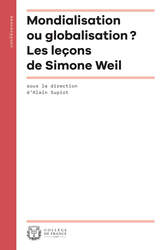
► Référence complète : C. Labrusse-Riou, "Les figures juridiques de la personne : lire aujourd'hui La Personne et le Sacré", in A. Supiot (dir.), Mondialisation ou globalisation ? Les leçons de Simone Weil, Paris, Éditions du Collège de France, coll. "Conférences", 2019, pp. 165-182
____
► Résumé de l'article :
____
🦉Cet article est accessible en texte intégral pour les personnes inscrites aux enseignements de la Professeure Marie-Anne Frison-Roche
________
Nov. 28, 2018
Publications
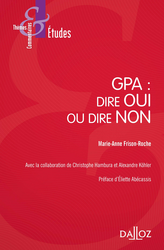
🌐suivre Marie-Anne Frison-Roche sur LinkedIn
🌐s'abonner à la Newsletter MAFR Regulation, Compliance, Law
____
► Référence complète : M.-A. Frison-Roche, GPA : dire Oui ou dire Non, avec la collaboration de Christophe Hambura et Alexandre Köhler, préface d'Éliette Abécassis, Dalloz, novembre 2018, 161 p.
____
► Présentation générale de l'ouvrage : Les situations juridiques de GPA et les différents droits applicables sont souvent présentés comme « complexes ». C'est faux. Il s'agit toujours d'une femme qui « consent » à porter un enfant pour le donner à la naissance à ceux qui ont commandé sa venue au monde. Face à ce fait simple, le Droit choisit soit d'instituer un lien de filiation entre la femme et l'enfant soit de l'instituer entre l'enfant et ceux qui l'ont désiré. Dans le premier cas, c'est la maternité qui fait la filiation, dans le second cas c'est le pur désir d'enfant. Dans le premier cas, les entreprises sont exclues car on ne peut vendre le lien de maternité, dans le second cas elles sont centrales car on paye pour concrétiser son désir d'enfant. Le choix est aujourd'hui ouvert. C'est un choix de société.
Les États-Unis et l'Europe sont souvent présentés comme ayant fait les mêmes choix. C'est faux. La Californie a fait le choix du désir d'enfant, servi par le consentement, l'argent et le contrat. L'Europe s'y refuse : pour protéger les êtres humains, lois et juges ne scindent pas le corps des femmes et des enfants de la notion de « personne ».
Comment et jusqu'à quand ?
____
📕consulter la table des matières
____
📝lire l'article d'introduction de Marie-Anne Frison-Roche
____
🚧lire le document de travail ayant servi de base à la partie de l'ouvrage rédigée par Marie-Anne Frison-Roche, enrichie dans sa version numérique par des notes de bas de page, des références techniques et de liens hypertextes
________
Nov. 21, 2018
Publications
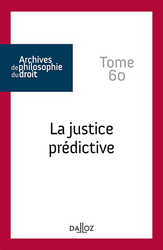
Référence générale : Frison-Roche M.-A., Pour protéger les êtres humains, l'impératif éthique de la notion juridique de personne, in in "Droit et Ethique" (dossier spécial des Archives de Philosophie du Droit) Archives de Philosophie du droit (APD), La justice prédictive, Dalloz, 2018, z, pp. 363-378.
Résumé : C'est par le Droit que l'être humain a acquis en Occident une unité (I). Ce que la Religion avait pu faire, le Droit l'a également fait en posant sur chaque être humain la notion indétachable de lui de « personne » (I.A). Mais c'est cela qui est remis en cause aujourd'hui, non pas la personnalité et le pouvoir que l'être humain a d'exprimer sa liberté mais l'unité que cela implique dans la disposition que l'on a de soir en repoussant le désir qu'autrui a toujours eu de disposer de nous. Le Droit actuel tend en effet à « pulvériser » les êtres humains en données et à transformer en prestations juridique de « consentement », cessant d'être une preuve d'une volonté libre mais devenue une notion autonome , y suffirait (I.B.).
Pour empêcher que ne règne plus que la « loi des désirs », laquelle ne fait que traduire l'ajustement des forces, il faut requérir ici et maintenant la souveraineté éthique du Droit, parce que le Droit ne peut pas être qu'une technique d'ajustement des intérêts (II). L'on peut former cette requête si l'on ne veut pas vivre dans un univers a-moral (II.A), si l'on constate que l'unité de la personne est l'invention juridique qui protège l'être humain faible (II.B.). Si on en admet l'impératif, il faut alors se demander enfin qui en Droit va l'exprimer et l'imposer, notamment de la Loi, ou du Juge, car nous semblons avoir perdu la capacité de rappeler ce principe de la Personne sur laquelle l'Occident fut si centré. Or, les principes qui ne sont plus dits disparaissent. Il ne resterait plus alors que l'ajustement au cas par cas des intérêts entre êtres humains dans champ mondial des forces particulières. À cette aune, le Droit ne serait plus qu'une technique de sécurisation des ajustements particuliers. (II.C). Réduit à cela, le Droit aurait perdu son lien avec l'Éthique.
Consulter une présentation de l'ouvrage dans lequel l'article est publié.
Voir la présentation d'autres tomes des Archives de Philosophie du Droit.

Oct. 1, 2018
Publications

► Full Reference: Frison-Roche, M.-A., Competition Law & Compliance Law , Working Paper, October 2018.
____
► this Working Paper has served as basis for an Article published later in French in the Review Concurrences ; read the presentation in English of this Article.
____
► Summary and introduction : Compliance Law is a new branch of Law, still under construction. One can have a "narrow definition" of seeing it as the obligation of businesses to show that they are constantly and actively complying with the law. One can have a richer definition, of a substantive nature, defining it as the obligation or the own will of certain companies to achieve "monumental goals" that go beyond economic and financial performance.The Competition Law partly integrates its two conceptions of Compliance: Precursor, the Competition Law concretizes dynamically the first conception of the Compliance Law (I) It is with more difficulties but also much more future that the Competition Law can express in dialectic the second conception of the Compliance Law as internationalization of these "monumental goals", especially in the digital space (II).

Updated: Sept. 8, 2018 (Initial publication: April 30, 2018)
Publications

► This working document was intended to serve as a support for a conference pronounced in French in the conference Droit et Ethique ( Law & Ethics) of May 31, 2018 in a symposium organized by the Court of Cassation and the Association Française de Philosophie du Droit. French Association of Philosophy of Law on the general theme Law & Ethics.
See a general presentation of this conference.
Rather, it has served as a support for the article to be published in the Archives de Philosophie du Droit (APD). This article is written in French.
► Summary: It is through the Law that the human being has acquired a unity in the West (I). What religion could have done, the Law also did by posing on each human being the indetachable notion of him of "person" (I.A). But this is what is challenged today, not the personality and the power that the human being has to express his freedom but the unity that implies in the disposition that we have of ourselves in repelling the desire that others have always had to dispose of us. Current law tends to "pulverize" human beings into data and transform into neutral legal services what was considered before as the devouring of others. The legal concept of "consent", ceasing to be proof of a free will but becoming an autonomous concept, would suffice (I.B.).
To prevent the reigning of the "law of desires", which merely reflects the adjustment of forces, we must demand here and now the ethical sovereignty of Law, because Law can not be just just be just the interests adjustment (II). We can form this request if we do not want to live in an a-moral universe (II.A), if we see that the unity of the person is the legal invention that protects the weak human being (II.B.). If we admit this imperative, then we must finally ask who in the legal system will express and impose it, especially the legislator or the judge, because we seem to have lost the ability to recall this principle of the Person on which the West was so centered. But the principles that are no longer said disappear. There would then remain only the case-by-case adjustment of interests between human beings in the world field of particular forces. At this yardstick, Law would be more than a technique of securisation of particular adjustments. Law would be reduced at that and would have lost its link with Ethics. (II.C).

Aug. 2, 2018
Publications

► Complete reference: Frison-Roche, M.-A., Yes to the principle of the will, No to the pure consents, working document for an article written in French Oui au principe de volonté, Non aux consentements purs, to Mélanges dedicated to Pierre Godé, 2018, available at http://mafr.fr/ en / article / yes-in-principle-of-the-desire-not in the consent /
► Summary: Pierre Godé devoted his thesis to defend the freedom of the human being, freedom that the person exercises by showing his will. This will manifests itself, even tacitly, by this trace of "consent". In a liberal society, politically and economically, that is to say a society based on the principle of the will of the person, consent must always be defined as the manifestation of the will, this link between consent and will being indivisible ( I). But by a perversion of liberalism, "consent" has become an autonomous object of the freedom of the person, mechanical consent that has made it possible to transform human beings into machines, machines to desire and machines to be desired, in a world of " pure consents","where we keep clicking, consenting to all without ever wanting. This consent, which has been split from the free will of the person, is the basis of the markets of the Human and the illiberal democracies, threats against human beings (II). The future of Law, in which Pierre Godé believed, is to continue to aspire to protect the human being and, without countering the free will of the human being as the movement of the law of the consumption had been tempted to, to renew with a liberal movement of Law and to fight against these systems of pure consents (III).
🔻read the article below (in French).
July 3, 2018
Thesaurus : Doctrine
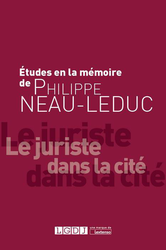
► Référence complète : Malabat, V., et Auzero, G., Les lanceurs d'alerte, in Études en l'honneur de Philippe Neau-Leduc, Le juriste dans la cité, coll. « Les mélanges », LGDJ- Lextenso, 2018, pp.673-684.
📕Lire une présentation générale dans lequel l'article est publié.